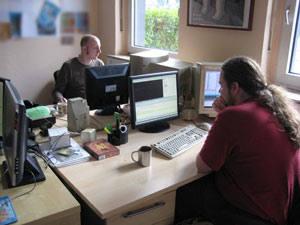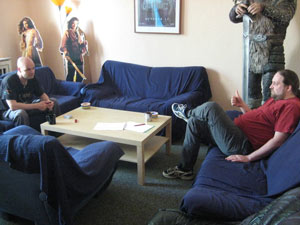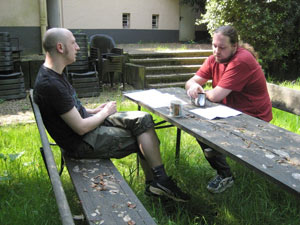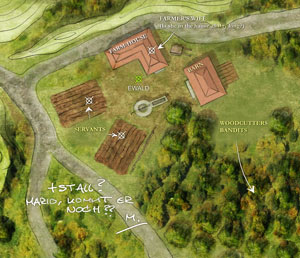Story tutorial
Released: 17.8.2008
Translated by: El Kamil
Source: http://worldofrisen.de/
What is actually the story doing all day long? It rarely happens, that we are asked about this. And that's why we'd like to use this tutorial to give you a short look into our work. Our job is to fit together various game elements (NPC, story background, settings etc.) and to lead them to logic and exciting stories. Using some small examples we'd like to explain you, how it works:
Note: This is only an imaginary example. Because of that, we consider the planning phase to be finished and also the world (the farm and surroundings) is also created. The game development is still going on of course, so we often rebuild some of game elements and sometimes we are even planning new ones.
We are in a typical RPG fantasy world and we take a look at this small piece of this world:
Settings
Somewhere in the mountains and woods, nearby the merchants path there is a farm. The only thing that the people here want is to live a peaceful life. What belongs to the farm: a farm-house, a barn, a cowhouse and a couple of fields.
Who lives on the farm? - A farmer, of course. Then we've got here place for two servants, the farmer's wife and many animals. The farmer is the main character in this "level". He owns the farm, so he's the boss there.
Note: How many main characters are in the game depends on the certain game (size of the game world and story).
Name
When choosing a name it's very important, that the main characters should have the name, which matches their role. So we won't give the farmer name like Thorsten, Jörg or Ignaz, but we look for an earthy name with a bit diligence. So we call him Ewald. (Note: A scholar we would probably call Theophilos.) Other inhabitants are not so important and that's why they won't get a name. We may call them Servant and Farmer's wife.
Background
Ewald's farm lies far away from the city and nobody would come to help him, if he would have troubles. Everything he has is thanks to his hard work and now he has to defend yourself. He has responsibility to his wife and to his servants. We must to ask some questions to explain Ewald's social standing:
Has he got any troubles with his servants? Are they lazy or hardworking?
Is his wife mad about his work or alcohol?
Or is everything on the farm in order?
These questions are defining Ewald's character and his behaviour. Lots of it you won't see in the game, however it helps us to understand his character and his motivation. According to custom Ewald works each day and his life goes on in a familiar way. But this is not enough for a game. We need some trouble, a possible conflict, just something, that could occupy the player. For example a near forest. There live wolfes. Or bandits. Or both. We decided for a boodle of bandits.
After this deliberation we adjust Ewald:
Head
The main characters have a special 3D model of the head. Other characters have various heads from the heads list. We are naturally pay attention to match the head to the character's role. We won't place two charakters to one other with the same head model as well.

Voice
Also the voice has an influence on the character. For Ewald it's more suitable an older voice than a clear and young one. It should sound strong and darkly. Ewald always says, what he wants to say, he's grumpy indeed, but he's honest and as the boss he is used to giving orders.
Clothes
The creation of armors and clothes is a hard work. That's the reason why not each role gets its own clothes. To recognize Ewald as the boss, he'll get another clothes than his servants. They wear a shirt and trousers, while Ewald has leather smith clothes.
Note: For better look we add some variations to existing armors. We give the leather clothes to smith, alchemist and now also to Ewald.
Difficulty
It shouldn't be easy to defeat Ewald. What has he done before he became a farmer? He has worked many year as a farm-worker. According to that he couldn't train himself in fight, but in spite of his inexperience he's a strong fighter.
Note: We have to adjust his fighting skills, life energy, strenght etc. appropriately.
Items
What has Ewald got on him? Besides a piece of meat and a few gold coins he also has got a bottle of gin, because he isn't happy at all. And he's got a weapon, of course. To farmer suits better a cudgel, but the times when he beared down are gone. He greets everybody with open arms. This setting we repeat for each person on the farm. Now we must to give the farm some life. Let's distribute daily activities.
Daily routine
Ewald works, rests, eats, drinks and sleeps. With this system we can control time of the tasks and the tasks themselves. And here we have a challenge. Because it's up to player when he comes to the farm, it can happen, that Ewald lies in bed and snores. That's why it isn't so easy to write the dialogues, which speak about some place.
- What are you doing in my kitchen?
- I'm sitting here in the farm-house.
- Welcome in my lab!
These sentences sound strange, if the person can't be found in mentioned place. So either we let it by or we work with Pre-Start-Routines.
Pre-Start-Routines fix the character to a certain place all day long. That means, that you won't meet any person when he (for example) sleeps. You should always have a reason when you want to use Pre-Start-Routines (e.g. a gate guard). In our case we use Pre-Start-Routine: Ewald guards his farm because of bandits hidden in the forest. So everytime the player goes to the farm, he meets him. He can still decide, if he talks to him. Ewald is ready and has all items on him. So where is the game?
So let's make some action. We have already decided for the bandits.

Dialogues
Dialogues are very important part of the game. Because of that it's the major part of making of story.
Note: How long does it take to write one dialogue? That's hard to say - some are done within an hour, some take whole days. It's very important to have a goal. When you know, where you want to go, the travel is running faster.
The Dialogues are inserted into the game through the editor and they contain a mix of information (about the world and quests) and character. When writing a dialogue it's important to follow these things:
When the dialogue ends? Is it available from the beginning? Or from a certain timepoint?
Does the dialogue belong to any quest?
How does Ewald greet the player?
If the ingathering was good, Ewald would have enough goods to trade and he would greet the player as a possible buyer. But if the barn was robbed, he would be suspicious, that the player is with the bandits. At first the player must convince him, that he comes with a good faith. Ewald talks to the player, as soon as he sees him:
"Hey, man! What do you want on my land?"
Note: It could naturally happen, that this greeting would be unsuitable to the situation. For example when the player would be already too strong and would have a great armor. It would be the best, when Ewald says something like: "A warrior on my land? I have never seen someone like you here. What do you want?"
The player can ask some general questions: (The answer possibilities are emphasized, below is the dialogue.)
Player (P): I just want to take a look around.
Ewald (E): Here is nothing to see!
E: So if you aren't looking for a work, then go away!
P: I'm just passing by and I want to rest.
E: You want to rest? First you have to work, then you can rest!
P: I will work better, if I rest first!
E: Hmm, well. There is a mow in the barn. You can sleep there.
E: But stay away from my house!
P: Do you have any work for me?
E: Work? You don't look like a peasant.
E: You look more like a man of action. I could really use someone like you now.
P: Talk! Do you have any troubles?
E: Those damned bandits! They robbed my barn few days ago!
Note: The option "I just want to take a look around." will be deleted when the player choose one of two another options. It's due to the meaningful consecution.
Thus we get some ohter options:
P: What do you know about those bandits?
E: My wife didn't sleep and she saw them running in to the forest!
P: What did the bandits stole from you?
E: Those bastards took along three flour sacks. And a barrel of great beer!
Note: Naturally there aren't many valuables on the farm, but let's find something what has a value for Ewald.
P: I will bring those things back!
E: Really? If you manage it, I'll give you 10 gold pieces. But be careful - the forest is dangerous! At night there is a pitch dark!
E: Here, take this torch.
P: Do you have any idea, where could be their hide-out?
E: I don't, however try to ask the woodcutters. They might know something...
Note: This dialogue starts the "Bring farmer Ewald his goods back!" quest.

We implement the story using the editor.

Björn and Stefan at a design meeting. They always have got some papers and pencils on them.

When it's nice weather, Stefan and Mattias are working in the garden.
So, now we leave Ewald and our example. When the player brings him his things back, he'll say some more words and he'll give the player the promised gold.
And what says his wife? She saw the bandits. She might give the hero another task (Her ring was stolen...). The game in the forest can develop as well.:
- Some woodcutter joins the player, because he also wants get rid of the bandits.
- The woodcutters are in fact the bandits.
- The woodcutters are in danger due to the wolves.
- Or they just know nothing.
As you can see, there are many ways how to continue a story. From this point the story can have many directions. You've got the bandits as opponents, but you must to act with them like with the farm. They need the daily routines, troubles and goals. And the same for the woodcutters. So if you don't pay attention to the story, it grows and grows and you've got a work for many weeks. Next thing: The longer you work on a short story, the more complicated it is for the player to understand it. The goal "Bring Ewald his goods back" has always a bigger background.
So, that's the end. We hope, that you enjoyed the look into our work...
Good Luck!
Mattias, Björn and Stefan.


© Kamil Krásný & Paulie 2007




 Articles
Articles






